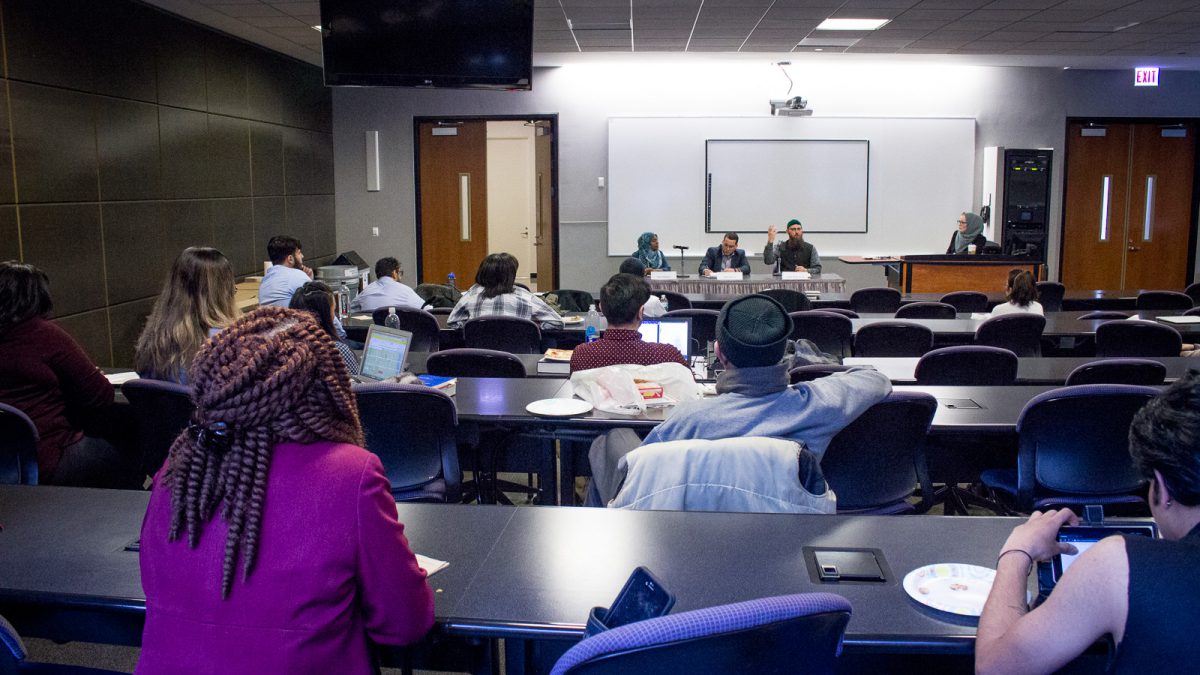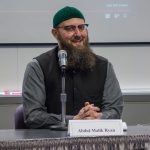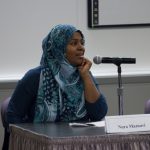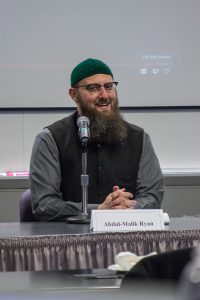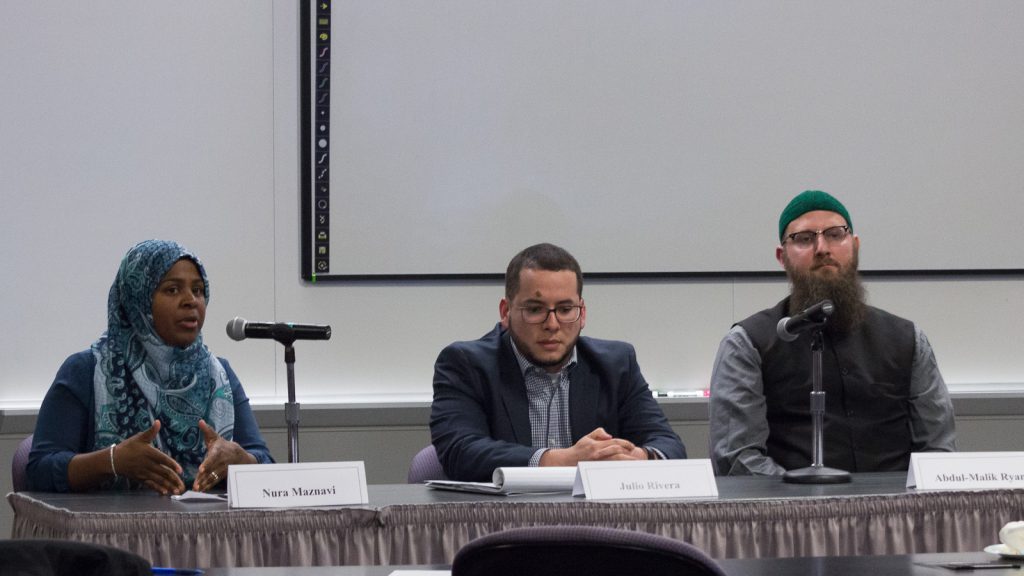Our Muslim Law Student Association hosted an “Ask Muslims Anything” event during our Diversity Week 2017, giving students a chance to submit questions about Islam or Muslims anonymously.
These questions covered a range of topics from historical Islam to understanding religious practices and challenges Muslims face in the United States due to common misconceptions or outright discrimination.
The panelists represented a range of different personal and religious backgrounds and offered contrasting perspectives throughout the discussion.
Panelists:
Abdul-Malik Ryan grew up in the Chicago suburbs in a Catholic family but joined a Muslim student group while studying African American history & Malcolm X at DePaul. He attended Georgetown University Law School and worked in the Cook County child protection system as an attorney before he was hired as DePaul’s Muslim chaplain.
Julio Rivera grew up in a Military family, living in Turkey as a child in a Muslim community. After 9/11 he began studying Islam to better understand the differences between his personal experience and the conflicts and images in the news. He had planned to enter the priesthood as a Catholic but converted to Islam while part of a Middle East studies program. He served as a Syria political analyst for the Department of Defense until 2012 and is now a research associate at University of Chicago, focusing on Syria & Middle Eastern studies
Nura Maznavi grew up in a Sri Lankan immigrant family in LA and is now married to a Muslim man from Chicago. She has a range of experience as a civil rights attorney, including working for the ABA Center for Pro Bono with law schools nationwide to increase volunteer capacity. She is also a writer with two published compilations and appeared in a TedxUChicago talk on society’s perception of Muslim women.
The event began with a short video highlighting common misconceptions Muslims in America hear regularly:
Q&A:
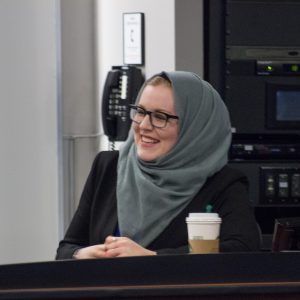 The question and answer panel was moderated by Caitlin Ajax, 2016-2017 secretary of Chicago-Kent’s Muslim Law student Association.
The question and answer panel was moderated by Caitlin Ajax, 2016-2017 secretary of Chicago-Kent’s Muslim Law student Association.
Most of the questions were submitted in advance anonymously, but the panel opened up for general questions at the end.
What should we know about the origin of Islam?
Abdul-Malik Ryan: Although Islam is often put into “Eastern Religions” studies, it shares origins with Judaism. The majority of modern Muslims today live in SE Asia, not the Middle East, despite that being the original source. Islam had to function as a minority religion at first. Since Mohammed served as the leader of his community, Islam has more content on how to function as a society.
Julio Rivera: Look at the problems Mohammed spoke about right away with society and corruption. The persecution early Muslim believers faced wasn’t based on their dress or culture. They fit into their society in terms of dress and culture. Persecution was based on their message pushing back against corruption and persecution of the poor. Addressing social justice and being a part of the solution is core to Islam.
What does Sharia mean to you?
Nura Maznavi: The call to social justice is how I view my legal career as service to my community. Sharia rulings on dress and action lead to personal conduct and are all symbolic of relation to God and expression of faith.
Abdul-Malik Ryan: Sharia law is not about government enforcement. It is a broader guidance from scripture. Even in Muslim communities, there can be a negative perception of hypocrites enforcing rules rather than personal choice in their faith. Sharia gives guidance on how to submit to God, on what to do in your life.
Different scholars will differ in how to interpret or apply this guidance into specific guidelines. There’s no one fixed book of Sharia laws. Even for American secular laws, ruling by the Constitution doesn’t lead to very specific practice in many cases. For religious guidance, it’s even more broad.
How do you react when you hear “Muslims can’t comply with Sharia and live in the laws of the U.S.”?
Nura Maznavi: Hearing that there’s a tug between Muslim and American identities didn’t fit her personal experience. It sounds like “othering” Muslims. She noted this was not her experience as someone born and raised Muslim in America.
Julio Rivera: This question is raised a lot in the counterterrorism field, looking at the issue of domestic terrorists in the United States. Muslim legal scholars firmly reject the idea that this is a religious argument that could be made. As a Muslim, you have agreed to act in accordance with the laws of the land. There is a religious obligation to keep your word. It would be much harder to sort out what to do if the U.S. made explicitly anti-Muslim laws, like enforcing eating pork, but there is no conflict with American laws.
Abdul-Malik Ryan: Many immigrants feel more free to practice their religion here because of our freedom of religion laws. Some young people feel more cultural conflict between their parents’ religious expectations vs. common American social norms, but that’s common with many youth, regardless of culture or religion.
Mr. Ryan noted the legacy of black Muslims in America is very countercultural, with many critiques and protests of American white supremacy and oppression. We don’t worship America, so we have a duty to God to follow laws that are just, not laws that are unjust. Many Christians have expressed this same feeling, as Martin Luther King, Jr. expressed in his Letter from a Birmingham Jail.
As a broader example of conflict between moral issues and the law, Mr. Ryan offered the issue of gay marriage: If someone was married before it was legal, was that acting against the law?
What are some challenges or opportunities you’ve seen as a Muslim in the legal profession?
Nura Maznavi: As a 2L at George Washington University School of Law in DC on 9/11, she saw so much fear in the city about what was going on. She’s now working at a law school again and sees this last election as another pivotal moment in society. Early in her career, she had 4 interviews with a law firm and found out later that she “looked too different” and so “wouldn’t be able to work with their clients.” She was advised not to do anything about it because she would seem too litigious and wouldn’t get a job.
Being a Muslim working in civil rights work has given Ms. Maznavi a different perspective: there are not a lot of older attorneys, she’s part of a 2nd generation of Muslim American attorneys. For many people in her communities, she was the only attorney people knew. She felt a big responsibility to connect people with the legal assistance they knew.
Later, working with prisoner rights litigation, she had clients who had specific religious needs that were not being met. That gave her yet another perspective on the challenges for Muslims in the legal profession. She didn’t want to respond about big corporate law, but said she thought many people aren’t happy in that field regardless of religion. She doesn’t find discrimination to be a recurring issue in her current field.
Julio Rivera: Most people don’t assume he’s Muslim because of his name. He said this has personal advantages. Working at the Department of Justice, people who would otherwise hide their opinions of Muslims shared them with him more openly.  He pointed out it’s good for him to see gaps in the understanding, since thinking through problems of perception was important for his job when he was working as an analyst.
He pointed out it’s good for him to see gaps in the understanding, since thinking through problems of perception was important for his job when he was working as an analyst.
Mr. Rivera emphasized he doesn’t hide information about his prayers or fasting. The people who need to know at his workplaces are aware even if he doesn’t lead it off in conversation. He also noted that the tendency to tokenize people can lead to pigeonholing, so not emphasizing his religion may have led to more opportunities rather than only one type of work.
Abdul-Malik Ryan: Noted that how he dresses does tell people immediately that he’s Muslim despite not fitting the racial profile most people expect. He said it’s great to see the support, the people who want to help you stay on track with your religious duties. It can be challenging in terms of corporate atmosphere, but that hasn’t been his experience personally. His experience working with children was a good way to hear what people think about religion: no filter!
How do you approach Muslim perceptions of modesty?
Nura Maznavi: It’s important to recognize the diversity of practice in different communities, often based on cultural as well as religious beliefs. She contrasted her personal experience growing up in Southern California’s SE Asian and Arab community to the expectations she’s met with black Muslims growing up on the south side of Chicago. From family to family in one community there can be very different experiences too, based on parental rules.
Julio Rivera: Women’s headscarves are often seen as signs of how religious the women are and what their personal choices are for a variety of cultural and religious practices, from prayers to drinking. Don’t make assumptions like that. Let them take the lead and define what they’re comfortable with.
Abdul-Malik Ryan: Depending on how well you know them, they may not feel comfortable talking about these topics. Don’t assume reasons for any of their personal religious choices or actions. There are many generational and cultural differences that lead to a variety of views and practices around modesty and many other modern issues.
How can non-Muslims be good allies right now? What should people not do?
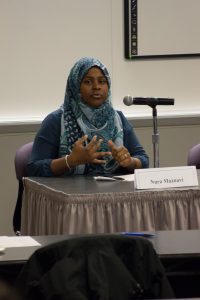 Nura Maznavi: The first thing is to listen! As an advocate for legal clients you may hear that you’re “giving them a voice,” but they already have a voice. It’s your job to amplify their voices. Use whatever power or privilege you have to amplify the voices of those who aren’t being heard. Look for ways that you can support religious accommodations in the workplace, for instance.
Nura Maznavi: The first thing is to listen! As an advocate for legal clients you may hear that you’re “giving them a voice,” but they already have a voice. It’s your job to amplify their voices. Use whatever power or privilege you have to amplify the voices of those who aren’t being heard. Look for ways that you can support religious accommodations in the workplace, for instance.
Many national organizations are doing great work, but she said it’s important to not forget the smaller local issues. These may seem insurmountable when they aren’t the big picture issues. Look for ways to support your neighbors wherever you live.
Julio Rivera: It’s a great first step to come to an event like this and listen. Look for opportunities to find the voices of individuals behind the big narratives. Twitter and other social media give you easy ways to follow the voices of prominent Muslim scholars and journalists and others who are telling these stories and perspectives. Your friends are important too, of course, but it helps to seek out the people who are most knowledgeable. It’s hard to be told what your religion is rather than being asked.
Abdul-Malik Ryan: If you’re not Muslim and you hear people saying things that are untrue or discriminatory, say something. Encourage people to hear from Muslims to build more accurate views. These can be very difficult conversations, especially with friends or family, but you can have the most impact and it’s so valuable to do this. If you take the time to think through these issues yourself, you’ll be a better ally. Take time to know what you think about religion and God for yourself.

Are there opportunities for interfaith work right now?
Abdul-Malik Ryan: He started by noting this is his job, but being paid to do this is unusual. Interfaith doesn’t have to be a formal group discussing religion. Anytime you’re with people of different faiths working together discussing life, you’re part of an interfaith effort. It’s a double-edged sword for Muslims because there are so many challenges right now. The workload often falls on just a few people and it can be very tiring. It’s good to be invited, but the pressure to bring more people in can be draining. Many people are volunteers since there are fewer institutional resources to do this professionally.
Nura Maznavi: Interfaith coalition building and allies is essential because the erosion of our systems – courts, media, etc., impact so many people. On a national scope this can be overwhelming. Starting local is easier. For example, neighbors and churches have been getting together to support refugee families in Hyde Park. Bookstores there are putting together an authors series. She said it’s often easier to look for local opportunities to build relationships, but this is a key long-term strategy too!
Where does idea of “religion of violence” come from?
Julio Rivera: People point to examples of people who look Muslim and claim to be Muslim committing violence, who make religious statements about violence and carry them out, so it seems to be motivated by Islam. Looking at the universe of data, he said it’s important to to see if it’s the ideology of these groups that’s creating this perception or if it is a part of a military strategy.
We only see threats against “us” instead of seeing the violence that’s happening much more often in specific battlegrounds. These groups are fighting existing states. Their strategies are violent as a military strategies rather than religious ones. For example, suicide belts were originally used by Tamil Tigers and by Kurdish Marxist fighters – but they are always attributed to Muslims despite those earlier examples.
How can we understand social justice in different Muslim majority nations with issues like the treatment of homosexuality?
Abdul-Malik Ryan: Theological and practical discussions are often very separate. Persecution of homosexuals in Muslim countries may not be based on theological arguments. Look at the social justice protests of black Muslims in America too, to see how religious perspectives call out legal hypocrisy.
Julio Rivera: Institutionalized discrimination is based on a variety of factors in any country. Show of force against a vulnerable group is often done to defend against perception of weakness, for example. Are there local factors that we don’t have the context for that explain their actions? Do we only see example of violence? Understanding local politics is key.

